Belarusian government issues rare apology as thousands form human chain
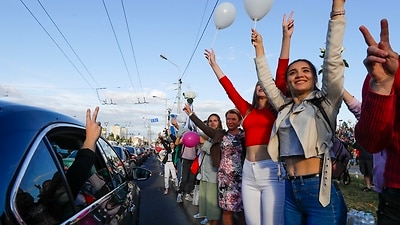
People greet each other waving flowers and balloons as they protest in the Belarus capital on 13 August. Source: AAP
VIDEOS
https://www.sbs.com.au/news/belarusian-government-issues-rare-apology-as-thousands-form-human-chain
The Belarusian government has issued a rare public apology in a bid to quell nationwide street protests.
An ally of Belarusian President Alexander Lukashenko has issued a rare public apology in a bid to quell nationwide street protests that pose the biggest challenge to the strongman leader's 26-year rule.
At least two protesters have died and thousands have been detained this week in a crackdown following President Lukashenko's contested re-election that has prompted the West to consider new sanctions on Minsk.
The emollient tone used in statements by two top state officials underscored the vulnerability of his hold over a country seen by neighbouring Russia as a strategic buffer against NATO and the European Union.
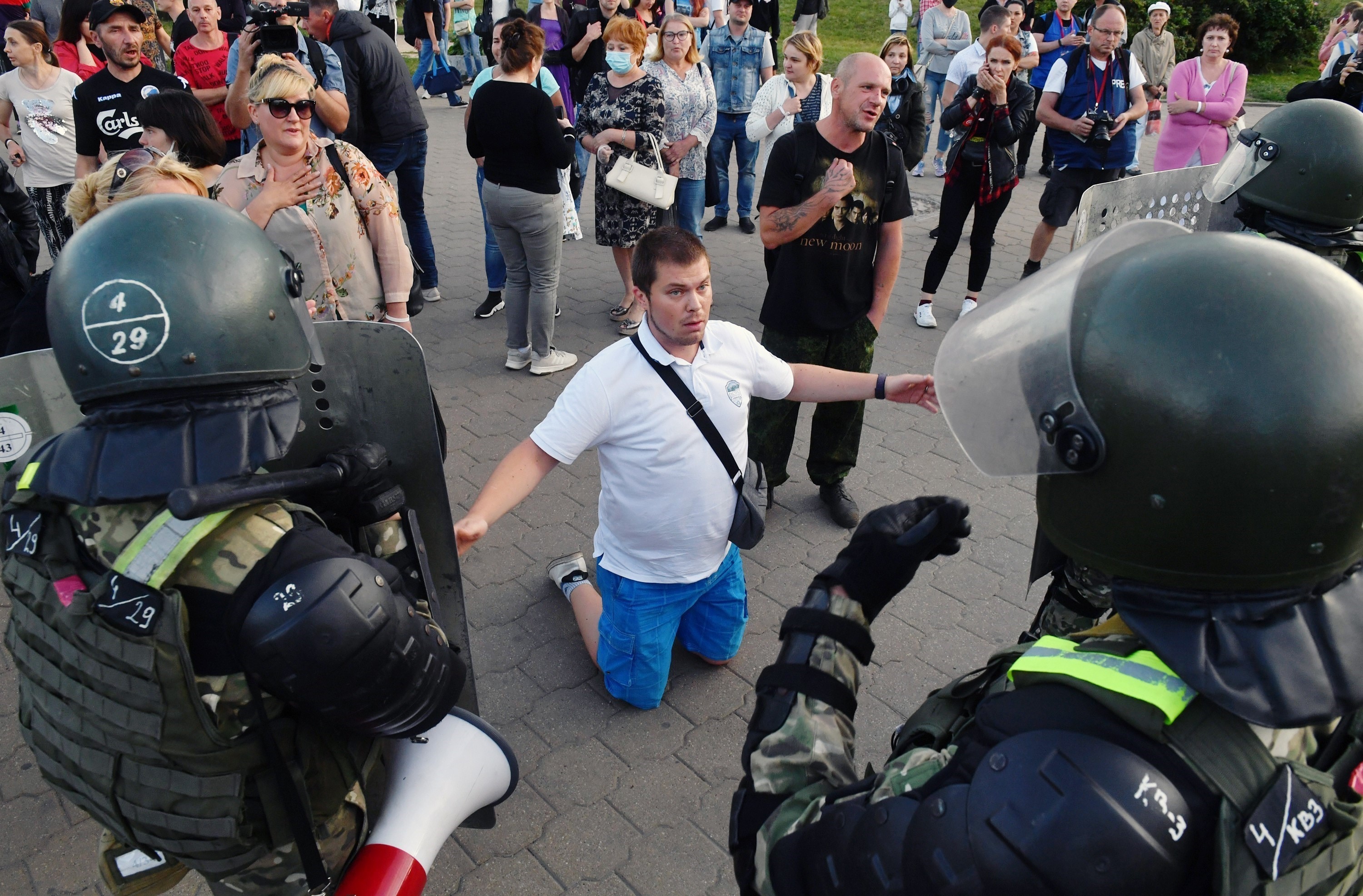
Protest rally against the results of voting in the Belarusian presidential election in Minsk.
Sipa USA Kommersant
Authorities have also begun releasing protesters, some of whom had bruises and described being tightly packed inside cells. They complained of mistreatment, including beatings.
"I take responsibility and apologise for injuries of random people at the protests who got it in the neck," said Minister of Internal Affairs Yuri Karayev on Thursday.
The protesters accuse President Lukashenko of rigging last Sunday's presidential election to win a sixth term. The president, alleging a foreign-backed plot to destabilise the country, has dismissed the demonstrators as criminals and unemployed.
But another presidential ally, the head of a national state council Natalya Kochanova, said on Thursday that Lukashenko had ordered an urgent review of the detentions.
"We don't fight, we don't need war," she said. "By this evening more than a thousand people have been freed under an obligation of not taking part in unsanctioned events."
Thousands form human chains
Several thousand men and women, many wearing white and holding flowers and balloons, held hands and walked through the capital Minsk to protest against police brutality during four nights of unrest since Sunday's vote.
The mood was more relaxed than on previous days as protesters strolled along a central street and lined main roads with drivers honking horns in support.
Supporters gave out free hot drinks and biscuits and police kept a low profile.
READ MORE
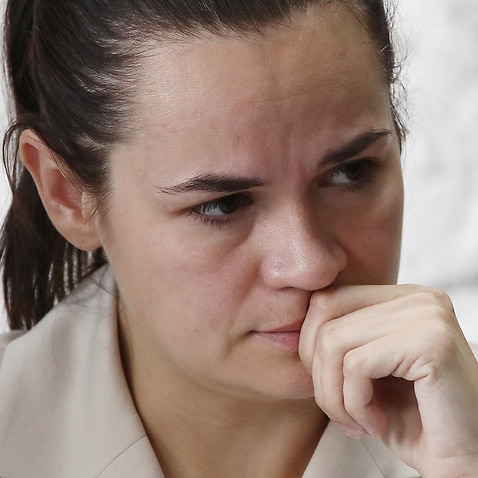
Belarus opposition leader fled to Lithuania 'for the sake of her children'
Similar human chains formed in half a dozen other cities, local media reported, while activists called for further protests at night.
People came out to contest the vote results and police used stun grenades, rubber bullets, tear gas, water cannon and, in at least one case, live fire to disperse the crowds.
At least two people have died and hundreds have been wounded in the violence while nearly 7,000 have been arrested.
'Change!'
On Thursday, demonstrators held placards reading "Change!" and "No violence" and wore white bracelets, one of the symbols of the opposition movement.
"We want to show that we, the women of our country, are against violence," said Yekaterina, a 38-year-old hairdresser wearing a white sweater and jacket and holding a bunch of white flowers.
Maria, a 35-year-old sales assistant, said she came out in her lunch break.
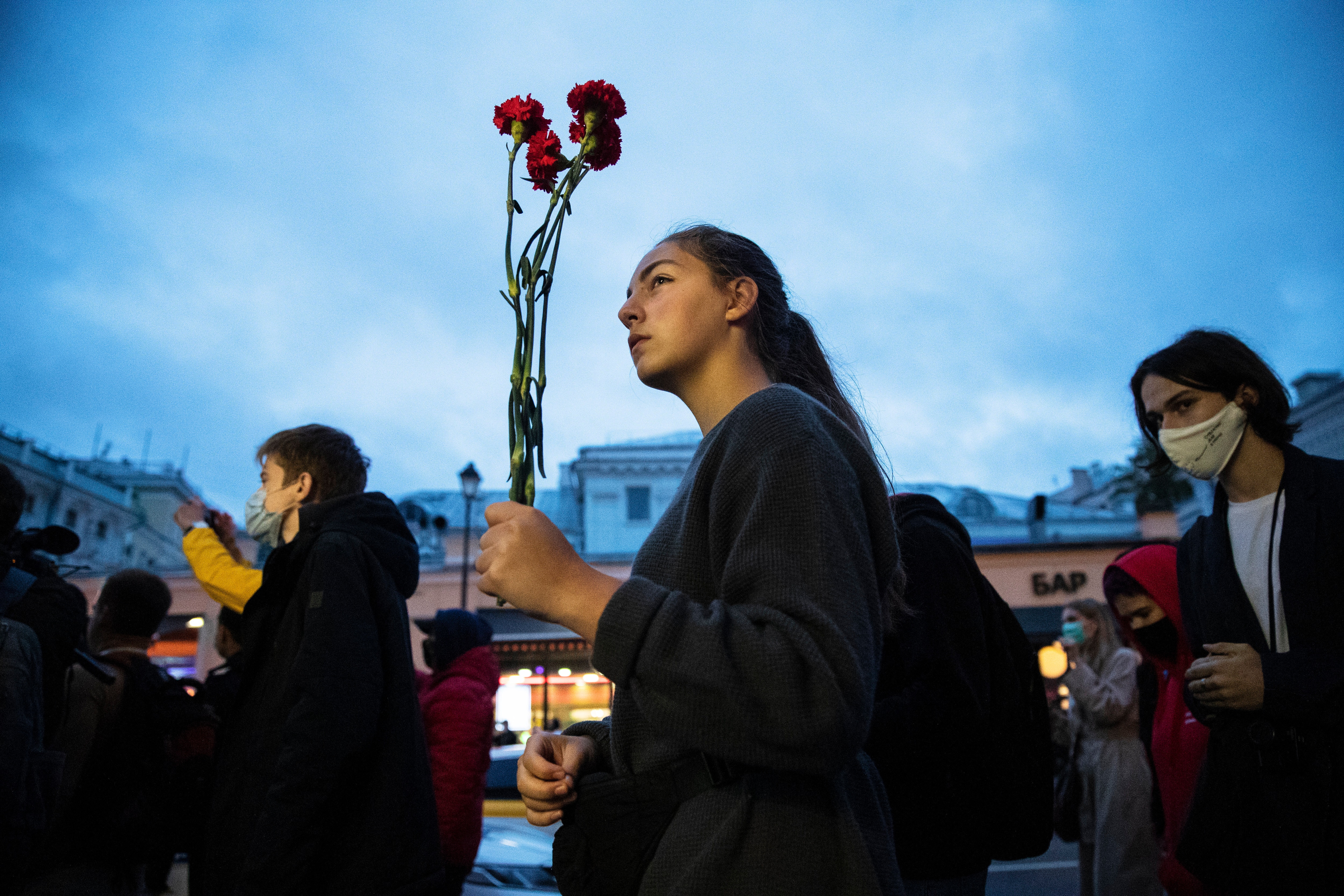
A woman holds flowers as people, some of them ethnic Belarusians, gather to support Belarusian opposition in Moscow, Russia, on 13 August.
AAP
"We want people to be able to protest peacefully, after all they didn't want anything bad, just a fair count of the votes."
A religious procession of various Christian denominations also took place in Minsk while workers at a several factories reportedly held strikes.
'What can we do to help?'
Russia's foreign ministry on Thursday denounced what it called "clear attempts at outside interference" aiming to destabilise its neighbour.
It said it was "concerned" at the "violations of public order."
The leaders of neighbouring Poland and the Baltic states urged Mr Lukashenko to "terminate the use of force against your people immediately."
European Union foreign ministers are set to discuss possible new sanctions on Belarus at an extraordinary meeting on Friday.
"What can we do to help?" US entrepreneur Elon Musk said on Twitter in response to a call to help Belarusians.
READ MORE

Women rally in Belarus as thousands are detained in government crackdown
Prominent Belarusians including Nobel Prize-winning author Svetlana Alexievich have condemned the violence and urged Mr Lukashenko, who has ruled Belarus with an iron grip since 1994, to step down.
The interior ministry said it arrested 700 people at protests on Wednesday, bringing the total number detained since Sunday to more than 6,700.
A senior politician on Thursday said Mr Lukashenko had ordered an investigation into the mass detention of protesters.
Senate Speaker Natalya Kochanova said on state television that Mr Lukashenko told officials to "get to the bottom of all cases of detentions", adding that "as of this evening, more than 1,000 people have been freed."
After large-scale gatherings in Minsk and other cities on Sunday, the protests have become scattered and smaller as police cordoned off city centres and shut down public transport.
'Inhumane actions'
The interior ministry said Wednesday that police opened fire on a group of protesters armed with metal rods in the southwestern city of Brest, wounding one.
Officials also confirmed a second death in the unrest, after police said one protester died on Monday when an explosive device went off in his hand.
The Belarusian Investigative Committee, which probes major crimes, said a 25-year-old man died after he was detained on Sunday in the southeastern city of Gomel and sentenced to 10 days in prison.
His mother told local media he had heart problems and had gone out to see his girlfriend, not to take part in protests.
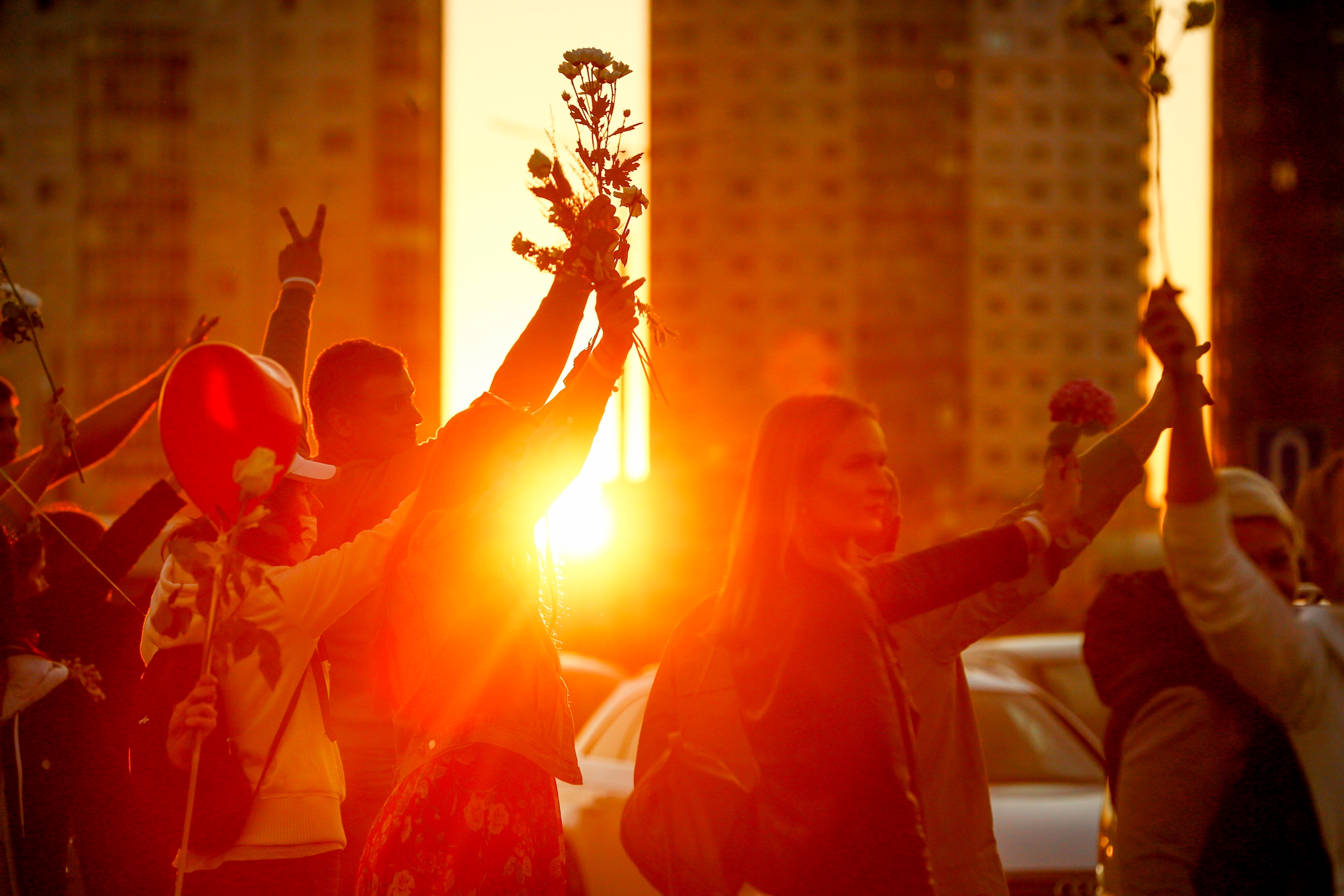
People wave flowers as they gather to protest during sunset in Minsk, Belarus, on 13 August.
AAP
People detained in recent days have told the Guardian of beatings, of being packed into small cells, and of men being kept in stress positions for hours.
One woman named Kristina said she was arrested and taken to a holding centre on the outskirts of Minsk, where she and 10 other women were forced to strip naked on camera.
She told the Guardian she was later taken to a room where 10 naked men were made to kneel while being beaten.
In an interview with RFE/RL, Ms Alexievich, winner of the 2015 Nobel Literature Prize, spoke of her shock at the "inhumane, satanic" actions of riot police and urged Mr Lukashenko to go peacefully.
Foreign-controlled 'sheep'
Other prominent Belarusians have joined calls for the violence to end.
Four-time Olympic biathlon champion Darya Domracheva wrote on Instagram: "Stop the violence. Do not allow this unjust horror to continue on the streets".
Several prominent journalists and presenters on state channels have tendered their resignations.
The protests broke out after authorities said Mr Lukashenko won 80 percent of the vote in Sunday's election to secure a sixth term.
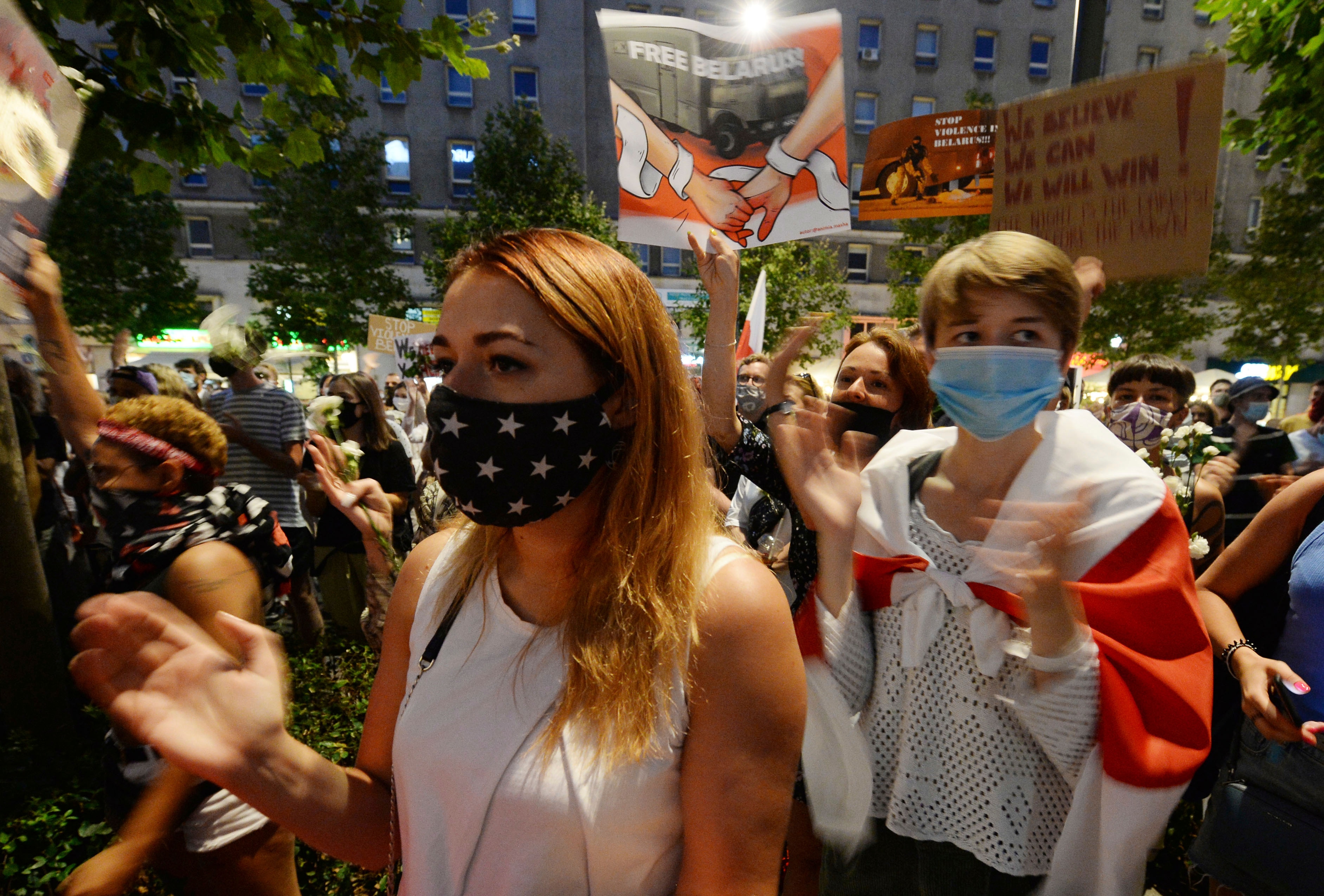
People demonstrate in support of Belarus protesters in Warsaw, Poland, on 13 August.
AAP
Mr Lukashenko, 65, has dismissed the demonstrators as foreign-controlled "sheep".
The protest movement arose in support of Ms Tikhanovskaya, a 37-year-old political novice who ran for president after potential opposition candidates including her husband were jailed.
The official results gave her 10 percent of the vote, but Ms Tikhanovskaya said the election was rigged and claimed victory, demanding that Mr Lukashenko hand over power.
She left for neighbouring Lithuania on Tuesday as allies said she came under official pressure.
SOURCE AFP - SBS, AAP
'We don't need war': Belarus releases detainees in bid to quell protests
Andrei Makhovsky, Vasily Fedosenko
MINSK (Reuters) - The Belarusian leadership began releasing thousands of detainees and issued a rare public apology on Thursday in a bid to quell nationwide street protests that pose the biggest challenge to strongman President Alexander Lukashenko’s 26-year rule.
People greet each other during an opposition rally to protest against police violence and to reject the presidential election results in Minsk, Belarus August 13, 2020. REUTERS/Vasily Fedosenko
Hundreds of friends and relatives, many of them in tears, stood outside a detention centre in Minsk waiting to give food, water and blankets to people emerging from inside in the early hours of Friday.
Some of the protesters had bruises and described being tightly packed inside cells and complained of mistreatment. Deputy Interior Minister Alexander Barsukov denied the prisoners were abused and said all detainees would be freed by morning.
At least two protesters have died and around 6,700 were detained this week in a crackdown following Lukashenko’s contested re-election that has prompted the West to consider new sanctions on Minsk.
The detainees’ release and the emollient tone used by two top state officials underscored the vulnerability of Lukashenko’s hold over a country seen by neighbouring Russia as a strategic buffer against NATO and the European Union.
“I take responsibility and apologise for injuries of random people at the protests who got it in the neck,” said Minister of Internal Affairs Yuri Karayev.
Tens of thousands of protesters on Thursday were joined by workers from some state-run industries that are the pride of Lukashenko’s Soviet-style economic model, including the Minsk Automobile Plant (MAZ) that makes trucks and buses.
Footage showed them chanting “elections” and “go away”. Local media also reported protests at the state-run haulage and earthmoving equipment manufacturer BelAZ in a town northeast of Minsk, and at the Grodno Azot chemical plant.
Protesters formed human chains and marched in the capital, backed by at least 10 television presenters and reporters from the tightly controlled state media who resigned in solidarity.
The protesters accuse Lukashenko of rigging last Sunday’s presidential election to win a sixth term. The president, alleging a foreign-backed plot to destabilise the country, has dismissed the demonstrators as criminals and unemployed.
But another presidential ally, the head of a national state council Natalya Kochanova, said on Thursday that Lukashenko had ordered an urgent review of the detentions.
“We don’t fight, we don’t need war,” she said.
RUSSIA ALLEGES MEDDLING
In Minsk, ambassadors from EU countries laid flowers at the site where one protester died, as a crowd cheered and chanted.
“We are here to mourn the loss of life and also to show solidarity with the victims of the violence and abuse that has taken place over many Belarusian towns and cities over the last few days,” EU envoy Dirk Schuebel told reporters afterwards.
Lukashenko has sought better relations with the West amid strained ties with traditional ally Russia.
The EU partially lifted sanctions, imposed over Lukashenko’s human rights record, in 2016, but could introduce new measures as early as this month. Germany called on the EU to put pressure on Lukashenko.
Russia, which has nudged Lukashenko into accepting closer political and economic ties, expressed concern over what it depicted as attempts by external forces to destabilise Belarus.
A former Soviet collective farm manager, the 65-year-old Lukashenko has faced increasing anger over his handling of the coronavirus pandemic - which he dismissed as a “psychosis” - a sluggish economy and human rights.
Sergei, one of the freed detainees, said there had been 28 people in a cell that would normally contain five. Prisoners took turns to sleep, he said, and were given a single loaf of bread to share out over two days.
Reuters could not independently verify his account.
“They did not beat me in the cell, they took me out of the cell and beat me there,” said Sergei, who declined to give his last name.
Reporting by Andrei Makhovsky and Vasily Fedosenko in Minsk; Additional reporting by Anton Zverev and Andrey Ostroukh in Moscow and Gabriela Baczynska in Brussels; Writing by Matthias Williams; Editing by Alex Richardson, Giles Elgood, Grant McCool and Michael Perry
Protestors form 'solidarity chains' to condemn post-vote crackdown in Belarus
Issued on: 14/08/2020

People hold flowers while lining up along a traffic way during a demonstration against violence following recent protests to reject the presidential election results in Minsk, Belarus August 13, 2020. © Vasily Fedosenko, Reuters
Tens of thousands of Belarusians staged a wave of peaceful protests on Thursday against President Alexander Lukashenko's disputed re-election and an ensuing brutal police crackdown
In apparent concessions on Thursday evening, Belarus announced the release of more than 1,000 detained protesters and the interior minister apologised to injured bystanders.
This came as European countries condemned the police violence and the European Union was set to discuss possible sanctions on Friday.
On Thursday evening in central Minsk crowds stood on the street cheering as cars drove past honking horns in support without any detentions, an AFP journalist saw.
Earlier an AFP journalist estimated tens of thousands of people, many wearing white and holding flowers and balloons, lined roads and filed through the capital Minsk to protest against police brutality during four nights of unrest since Sunday's vote.
Similar human chains formed in half a dozen other cities, local media reported.
Official statements suggested a more conciliatory approach following public outrage at extreme police violence including shootings and beatings.
Senate Speaker Natalya Kochanova said on television that Lukashenko had ordered officials to review detentions and more than 1,000 detained at protests had been released.
The interior ministry has said it has detained some 6,700 people at daily protests since Sunday.
Interior Minister Yury Karayev said on state television: "I apologise for the injuries of random people at protests who got caught in the middle."
Lukashenko's opponents accuse him of rigging the election to defeat his main rival, popular opposition candidate Svetlana Tikhanovskaya, who has left the ex-Soviet country for neighbouring Lithuania.
People came out to contest the vote results and police used stun grenades, rubber bullets, tear gas, water cannon and, in at least one case, live fire to disperse the crowds.
At least two people have died and hundreds have been wounded in the violence while nearly 7,000 have been arrested.
'Change!'
On Thursday, demonstrators held placards reading "Change!" and "No violence" and wore white bracelets, one of the symbols of the opposition movement.
"We want to show that we, the women of our country, are against violence," said Yekaterina, a 38-year-old hairdresser wearing a white sweater and jacket and holding a bunch of white flowers.
Large groups of workers at several major factories staged walk-outs, local media reported.
Russia's foreign ministry on Thursday backed Lukashenko, claiming it knew of "clear attempts at outside interference" and saying it was "concerned" at the unrest.
The leaders of neighbouring Poland and the Baltic states urged Lukashenko to "terminate the use of force against your people immediately."
European Union foreign ministers were set to discuss possible new sanctions on Belarus at an extraordinary meeting on Friday and Germany summoned the Belarusian Ambassador.
Prominent Belarusians have condemned the violence and urged Lukashenko, who has ruled Belarus with an iron grip since 1994, to step down.
In an interview with RFE/RL, writer Svetlana Alexievich, winner of the 2015 Nobel Literature Prize, spoke of her shock at the "inhumane, satanic" actions of riot police and urged Lukashenko to go peacefully.
'Inhumane actions'
The interior ministry on Wednesday acknowledged police deliberately fired on a group of protesters, wounding one.
Officials have confirmed two deaths of protesters.
Police said a protester died on Monday when an explosive device went off in his hand, while his widow told local media he was unarmed.
The Belarusian Investigative Committee, which probes major crimes, on Wednesday said a 25-year-old man died after he was detained on Sunday in the southeastern city of Gomel and sentenced to 10 days in prison.
His mother told local media he had heart problems and had gone out to see his girlfriend, not to take part in protests.
Foreign-controlled 'sheep'
The protests broke out after authorities said Lukashenko won 80 percent of the vote in Sunday's election to secure a sixth term.
Lukashenko, 65, has dismissed the demonstrators as foreign-controlled "sheep".
The protest movement arose in support of Tikhanovskaya, a 37-year-old political novice who ran for president after potential opposition candidates including her husband were jailed.
The official results gave her 10 percent of the vote, but Tikhanovskaya said the election was rigged and claimed victory, demanding that Lukashenko hand over power.
She left for neighbouring Lithuania on Tuesday as allies said she came under official pressure.
(AFP)
Defiance in Belarus as ‘Europe’s last dictator’ wins reelection, TV anchors quit and police crack down
BY YURAS KARMANAU
ASSOCIATED PRESS |
AUG 13, 2020

People with flowers and old Belarusian national flags gather to protest against the results of the country's Election (Sergei Grits/AP)
MINSK, BELARUS — Crowds of protesters in Belarus swarmed the streets and thousands of workers rallied outside industrial plants Thursday to denounce a police crackdown on demonstrations over a disputed election that extended the 26-year rule of authoritarian President Alexander Lukashenko.
Beginning in the morning, hundreds of women formed long “lines of solidarity” in several areas of the capital, Minsk. Many were dressed in white and carried flowers and portraits of loved ones who have been detained during protests that began shortly after Sunday’s vote, which they said was rigged.
The human chains grew throughout the day, filling the main central squares and avenues as motorists honked in support. In Minsk and many other cities, thousands of factory workers also rallied against the police violence, raising the prospect of strikes in a new challenge to the government.
Amid growing public dismay, dozens of military and police veterans posted videos in which they dumped their uniforms and insignia in the trash. Several popular anchors at Belarus’ state TV stations have quit.
Nearly 7,000 people have been detained and hundreds injured in the clampdown on demonstrators protesting the official results that said Lukashenko won 80% of the vote and his top opposition challenger got only 10%. Police have broken up protests with stun grenades, tear gas, rubber bullets and severe beatings.

A woman fights with a police officer as other officers detain an opposition supporter protesting election results in Minsk, Belarus, on Aug. 11, 2020. (AP photo)
MINSK, PORTLAND, BEIRUT, CHILE, HONG KONG, THE STRUGGLE IS THE SAME
“Belarusians have seen the villainous face of this government. I argued with my husband and voted for Lukashenko. And this is what I got in the end — I can’t find my relatives in prisons,” said Valentina Chailytko, 49, whose husband and son were detained in protests Sunday. She has been unable to get any information on their whereabouts.
One protester died Monday in Minsk after, the Interior Ministry says, an explosive device he tried to throw at police blew up in his hand. Some media reports have challenged that official version. Neither the ministry nor the media outlets have provided evidence.
Thousands of people converged Thursday on the place where he died, many carrying flowers. European ambassadors also laid flowers at the site earlier in the day.
The authorities also confirmed that a detainee died in the southeastern city of Gomel, but the circumstances of his death weren't immediately clear.
Hundreds of medical workers joined the demonstrations Thursday in Minsk and many other cities.
“There is a feeling that a war is going on, but it’s a war against us,” said Mikhail Portnov, a 33-year old general practitioner. “We, doctors, see the price of this war as no one else. We were ready for violence, but the brutality of it has crossed all limits.”

About 200 women march in solidarity with protesters injured in the latest rallies against the results of the country's presidential election in Minsk, Belarus, on Aug. 12, 2020. (AP)
The unprecedented public opposition and unrest has been driven by the painful economic fallout from the coronavirus pandemic and Lukashenko’s swaggering dismissal of the outbreak as a “psychosis.” The vote and the brutality of the subsequent crackdown — remarkable even for Lukashenko’s iron-fisted rule — have made the anger boil over. The 65-year-old former state farm director has been in power since 1994 and was nicknamed “Europe’s last dictator” by the West for his suppression of dissent.
“You can see the election result in the streets,” said 32-year old engineer Andrei Gubarevich, who joined a demonstration in Minsk. “Lukashenko has already lost.”
Belarus’ Investigative Committee launched a criminal probe into the organization of mass rioting — an indication authorities may start leveling those charges against some detainees. The charges could carry prison terms of up to 15 years for those found guilty.

People help a wounded demonstrator during a mass protest following the presidential election in Minsk, Belarus, on Aug. 10, 2020. (AP)
The ministry said 103 police officers have been injured since Sunday, and 28 of them were hospitalized. In Minsk and the western city of Baranovichi, people ran over traffic police with their vehicles on Wednesday before being detained.
The brutal suppression of protests drew harsh criticism in the West.
The European Union foreign ministers are set to meet Friday to discuss a response, and German Foreign Minister Heiko Maas said the 27-nation bloc would “increase the pressure” on Belarus. “The brutal actions and the arrest of peaceful protesters and even journalists in Belarus isn’t acceptable in Europe in the 21st century,” he told reporters in Berlin.
U.S. Secretary of State Mike Pompeo said the election wasn't free or fair and urged the government to refrain from violence against peaceful protesters.
“I’m confident that EU and the United States fully share the same concerns about what has taken place and what is taking place in Belarus and I’m very hopeful that we can collectively work in a way that gets a better outcome for the people of Belarus,” Pompeo said Thursday on a visit to Slovenia.
Police appeared to scale back their response on Wednesday. In many parts of Minsk, the all-female “lines of solidarity” stood unchallenged for some time before police dispersed some of them without violence. Similar peaceful demonstrations were seen across the capital and other cities Thursday, but police refrained from dispersing them immediately.
Also Thursday, hundreds of workers at plants across the country, including the huge truck factories in Minsk and Zhodino, held rallies to protest the clampdown and demand a recount of the vote. Many shouted “Go away!” to demand Lukashenko’s resignation.
During a meeting with workers of a plant in Grodno, near the border with Poland, the local police chief apologized for the violent crackdown, according to tut.by news portal.
ANARCHY IN ACTION, SELF ORGANIZATION,
NO LEADERS, DIY
The demonstrations have spread even though the protest lacks leaders. The top opposition challenger in the vote, Sviatlana Tsikhanouskaya, suddenly emerged Tuesday in neighboring Lithuania and called on her supporters to stop protests in a video that her associates said was recorded under pressure from law enforcement officials before she left. The 37-year-old former teacher joined the race to replace her husband, an opposition blogger, who has been jailed since May.
Lukashenko has derided the political opposition as “sheep” manipulated by foreign masters and vowed to continue taking a tough position on protests.
But that has not deterred many.
“Protests will only grow,” said 25-year-old demonstrator Anna Shestakova in Minsk. “They can cheat some, but they can’t cheat the entire people.”

People wave flowers as they gather to protest against the results of the country's presidential election in Minsk, Belarus, on Aug. 13, 2020. (Sergei Grits/AP)
Daria Litvinova and Vladimir Isachenkov in Moscow, Matthew Lee in Bled, Slovenia and Frank Jordans in Berlin contributed.
The demonstrations have spread even though the protest lacks leaders. The top opposition challenger in the vote, Sviatlana Tsikhanouskaya, suddenly emerged Tuesday in neighboring Lithuania and called on her supporters to stop protests in a video that her associates said was recorded under pressure from law enforcement officials before she left. The 37-year-old former teacher joined the race to replace her husband, an opposition blogger, who has been jailed since May.
Lukashenko has derided the political opposition as “sheep” manipulated by foreign masters and vowed to continue taking a tough position on protests.
But that has not deterred many.
“Protests will only grow,” said 25-year-old demonstrator Anna Shestakova in Minsk. “They can cheat some, but they can’t cheat the entire people.”

People wave flowers as they gather to protest against the results of the country's presidential election in Minsk, Belarus, on Aug. 13, 2020. (Sergei Grits/AP)
Daria Litvinova and Vladimir Isachenkov in Moscow, Matthew Lee in Bled, Slovenia and Frank Jordans in Berlin contributed.
No comments:
Post a Comment